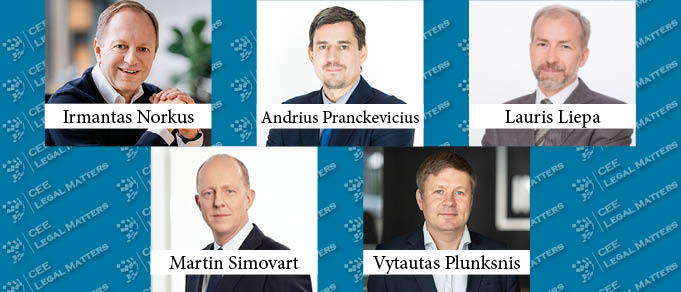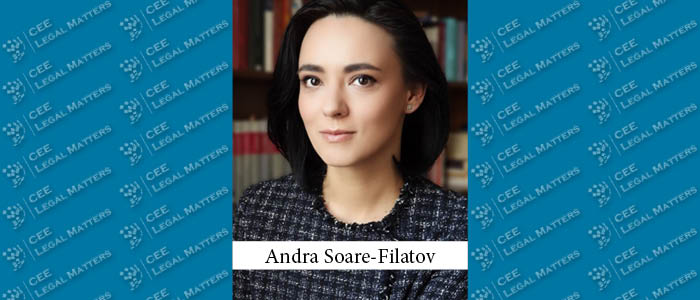In 2015, the word Cobalt took on a new meaning in the legal markets of Belarus, Estonia, Latvia, and Lithuania, when a new pan-Baltic law firm with that name opened its doors, immediately entrenched in the top tier of the region’s legal markets. That firm owes much of its success and reputation to the Managing Partner of its Lithuanian office and Chairman of the firm-wide Management Board, Irmantas Norkus.
Irmantas Norkus Considers His Choices
Lithuania gained its independence from the Soviet Union in 1991 – the year that Norkus began his legal studies at the Vilnius University. “I was thinking of foreign service,” Norkus recalls. “I wanted to be a part of the Lithuanian diplomatic corps. The way to do so was to graduate from law school. That was the driver for me to consider law, really.”
After working with the newly-formed Department of International Law at Lithuania’s Ministry of Justice in his third year of law school, Norkus went to London for six months on an internship with McKenna & Co. While in the English capital, he took the opportunity to learn about the workings of Lithuania’s Embassy to the United Kingdom, participating in a series of meetings with embassy officials (including the ambassador), attending embassy events, and making a presentation to investors in a seminar organized by the embassy. He remembers being disappointed at the absence of glamour in the corps. “I saw how Lithuanian diplomats lived and worked,” he says. “It was very different from what I imagined.”
Once back home, Norkus was faced with a decision about the career path to pursue. Finally, disenchanted with the prospects of a diplomatic career, and concluding that public service was neither as rewarding nor as challenging as he had hoped, he decided a career in law made more sense. “I wanted to be judged by my performance,” he says, “and in that sense, the legal market is more objective.”
Norkus finished near the top of his class in law school, he says, which, in addition to his experience with the Ministry of Justice and his internship with McKenna & Co. in London, made him attractive to potential employers. In 1995, he agreed to join Foresta, then one of the leading law firms in Lithuania.
In 2001, after obtaining his doctorate, he declined Foresta’s offer of partnership, choosing instead to launch his own firm. He explains that, to some extent, the decision surprised him as much as everybody else. “It really was not my idea to start my own firm,” he laughs. “I was invited by a client – a large commercial bank now known as Citadele – to head their in-house legal team, but I said no.” Instead, he says, “I offered to provide them legal services on a non-exclusive basis, which they accepted – and that is how Norcous & Partners was created.” (Norkus chose an alternate spelling of his name to make it easier for foreign clients).
Original and Reshuffled Pan-Baltic Firms
Over time it became clear to the law firms in the Baltics, to maximize their ability to serve clients, a presence in all three Baltic countries was required. Sorainen was among the first to pursue this strategy, opening its Estonian office in 1995, then expanding to Latvia in 1997 and Lithuania in 1999 (and then Belarus in 2008). Others, recognizing the potential benefits of a regional presence, quickly followed suit.
“Firms started to look for partners in other Baltic countries,” Norkus recalls, “to set up alliances able to serve the massive foreign investments coming into these countries because of the EU membership.” In 2004 Norcous agreed to join his firm to the Roschier Raidla alliance, forming the Lithuanian counterpart to Latvia’s Leijins, Torgans & Partners, Estonia’s Raidla & Partners, and Finland’s Roschier law firm. They weren’t alone. That same year also saw the creation of pan-Baltic firms Lawin (formed by Lithuania’s Lidelika, Petrauskas, Valiunas & Partners, Latvia’s Klavins & Slaidins, and Estonia’s Leipik & Luhaaar); and Glimstedt. Others followed in the next few years.
The pan-Baltic firms, Norkus believes, “helped us a lot to organize our business in a Western way and obtain an understanding of the value system of the Western law firms.” Referrals were a primary purpose as well, of course, and Norkus recalls that his firm received plenty: “Not only from Scandinavia, but also from Roschier’s friends from all over the world. That was a really big move for our firm.”
In 2008, the Roschier Raidla alliance fell apart, with the Baltic members staying together in the newly formed Raidla Lejins & Norcous. RLN opened a Belarus office that same year.
Clients were impressed with Norkus and his RLN colleagues. “I first met Irmantas in 2008, when the Linas Agro Group was preparing for its initial public offering,” recalls Andrius Pranckevicius, CEO and Chairman of the Board of PF Kekava and Deputy CEO of the Linas Agro Group. “We were about to go on the market amid a global financial crisis, and we were weighing which firm we should ask for assistance. We approached three firms, but we chose Raidla Lejins & Norcous.” According to him, it was Norkus’s personality that made the difference. “Even though they had no experience with IPOs, we chose them because of Irmantas’s dedication and energy. He was very optimistic and he was trying really hard to get us on board. We took the risk, and we were successful in our IPO.” He says, “we have been with Irmantas ever since.”
The only thing constant is change, however, and in the spring of 2015 the Baltic legal markets underwent another major reshuffling, with Raidla Lejins & Norcous and Lawin switching Estonian offices and rebranding as Cobalt (the name stands, its partners report, for “Cooperation in the Baltics”) and Ellex. Norkus cites financial reasons for the reshuffling, as the now-Cobalt firms preferred a greater degree of pan-Baltic integration, and the now-Ellex firms preferred less (not coincidentally, while the Ellex firms operate under their individual office names (i.e., Ellex Valiunas in Lithuania, Ellex Klavins in Latvia, and Ellex Raidla in Estonia), each Cobalt office operates only under the one name).
“I’ve always believed and I still believe in integration,” Norkus says. “You consolidate your costs, your energy, focus, and processes, so you become more efficient.” In fact, since its inception, Cobalt has strived to be as integrated as possible, and Norkus reports that, “we have joint marketing, a joint accounting and billing system, and joint practice groups that operate cross-border, as well as joint quality management control.
According to Cobalt Latvia Managing Partner Lauris Liepa, Norkus was instrumental in putting Cobalt together, and making it work. “He was the driving power behind integrating all of the cylinders in our engine.” Estonian Partner and Cobalt Head of Global Relations Martin Simovart is similarly complimentary: “Irmantas is quite a charismatic and enthusiastic person, and he certainly knows how to motivate people.”
As a result, when Cobalt was set up, it was unanimously decided that Norkus should become its first Chairman.
Cobalt’s Success
Cobalt currently operates offices in Vilnius, Riga, Tallinn, and Minsk, with its initial team of 127 lawyers in 2015 having now grown to over 200 (the Lithuanian office is largest, with 85 lawyers, including 18 partners, followed by Estonia with 69/12, Latvia with 45/9, and Belarusia with 8/1).
Over the years, the firm has advised on many high-profile and award-winning deals, including working on all three Baltic CEE Legal Matters Deals of the Year for each of the past two years: In 2019, the EUR 1 billion sale of 60% of the shares in Luminor to Blackstone (which won in all three countries); and in 2020, Apex’s acquisition of Baltic Classifieds Group from Up Invest OU in Estonia; airBaltic’s EUR 200 million bond issuance in Latvia, and Idex’s acquisition of Danpower Baltic UAB from Danpower and GECO Investicijos in Lithuania.
The firm’s continuing success reflects its overarching goal. “We would be like to be known as the leaders in the market, capable of assisting our clients with sophisticated and demanding cases,” Martin Simovart says. It appears they are. Vytautas Plunksnis, Head of Private Equity at INVL Asset Management, describes Cobalt’s M&A team as “one of the best in the market,“ and says that “in our flagship INVL Baltic Sea Growth Fund we currently have four portfolio companies and Cobalt helped us with three acquisition deals.“
“Irmantas is very entrepreneurial,” Andrius Pranckevicius says of Cobalt’s Managing Partner. “Unlike many lawyers, he doesn’t sit idly by, waiting for the next bit of work. He is a doer.” And, Pranckevicius adds, “his approach has spread to Cobalt. We are currently working on an important deal which should be closed in November. Irmantas and two of his younger colleagues are helping us on this case. It seems that some of his qualities have rubbed off on his younger colleagues, as I was amazed at how professional they were.” As a result, he says, “when it comes to quality legal service, Cobalt is our go-to firm.”
Looking Forward
The COVID-19 crisis disrupted Cobalt’s operations to an extent, as it did everyone else’s. Martin Simovart mentions that one of the ways the firm adapted to the new environment was by encouraging telecommuting. However, Norkus says, allowing lawyers to work remotely provided challenges of its own. “The concept of working from home resulted in some lawyers working as freelancers for different firms at the same time.” According to him, having lawyers freelance may be the way to go, though for the time being they’re staying with the traditional model.
The pandemic has also made it difficult for Cobalt’s leadership to hold its quarterly meetings, which have all but ceased due to the pandemic. “Normally, we would see each other four or five times a year,” Lauris Liepa says. “However, we haven’t seen each other in person for quite a while now. We take care of business via video calls nowadays.”
Ultimately, though, Norkus insists that the pandemic has caused no significant damage to the firm. “The outlook for 2021 is positive,” Norkus says, pointing to projections that business in the Baltic legal markets will continue to grow at the 3-5% rate it has for several years now. The firm’s goal, he says, does not involve geographical expansion. “Instead,” he says, “we want to secure and protect our market position, and continue building up the firm, so not to lose momentum.”
That seems like a safe prediction.
This Article was originally published in Issue 7.11 of the CEE Legal Matters Magazine. If you would like to receive a hard copy of the magazine, you can subscribe here.
























